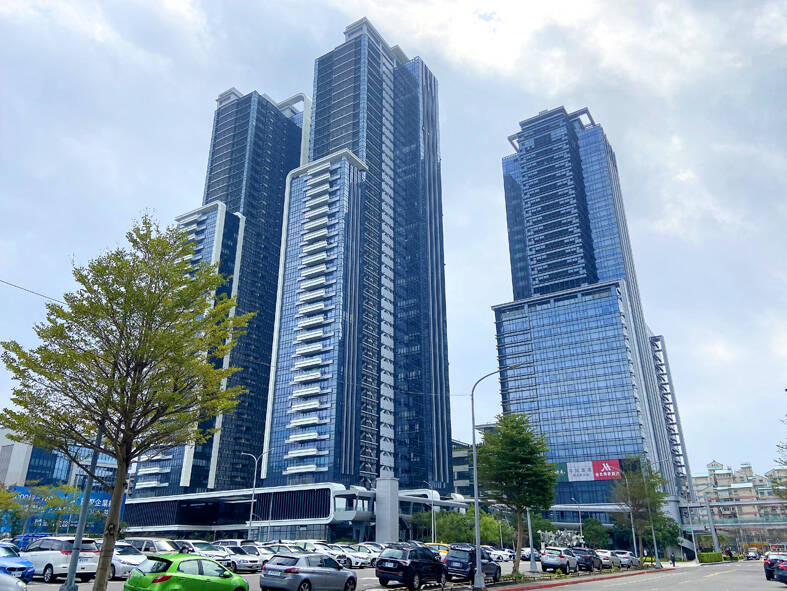Property transactions in the six special municipalities last quarter plunged 24.1 percent from a year earlier to 49,290 units, dragged by weak sentiment, although buying interest last month showed a noticeable improvement.
It was the lowest volume since 2018 as a series of interest rate hikes and unfavorable policy measures cast a shadow on the market.
“The ban on transfers of presale house purchase agreements and monetary tightening sidelined prospective buyers looking for bargains,” Great Home Realty Co (大家房屋) head researcher Mandy Lang (郎美囡) said on Thursday.

Photo: Hsu Yi-ping, Taipei Times
PRICING INFLEXIBILITY
However, expectations that prices would fall have yet to materialize, as sellers held firm, buoyed by a government pledge that the upcoming ban would not affect existing deals.
Weighed by economic uncertainty and pricing concerns, transaction during the January-to-March period fell 28 percent to 5,677 units in Taipei, slumped 25 percent to 12,521 units in New Taipei City and dropped 27.8 percent to 8,190 units in Taoyuan, government data showed.
Deals declined 23 percent to 9,870 units in Taichung, decreased 19 percent to 4,932 units in Tainan and fell 22 percent to 8,025 units in Kaohsiung.
Sellers would rather hold onto their properties than accept what they deem as unreasonable or humiliating offers, H&B Realty Co (住商不動產) research head Jessica Hsu (徐佳馨) said.
Pricing inflexibility accounted in part for the absence of panic selling — unlike in 2016 before the introduction of combined property taxes that drove investors to cut prices and exit the market, Hsu said.
MARCH PICKUP
The gloomy sentiment eased somewhat last month, with transactions in the six special municipalities standing at 20,860 units, down 17.4 percent year-on-year, but up 31.9 percent from February, Sinyi Realty Inc (信義房屋) said.
Pent-up real demand underpinned the pickup after price corrections failed to materialize, Sinyi research manager Tseng Ching-der (曾進德) said.
More working days and the completion of new residential projects also lent support to last month’s data, Tseng said.
Developers wrapped up construction of presale housing complexes in Taoyuan’s Gueishan District (龜山) and Tainan’s Gueiren District (歸仁), Taiwan Realty Co (台灣房屋) said.
Transactions are likely to stay soft in line with an economic slowdown, but the room for price corrections is limited given higher building material costs, the broker said.

Taiwan’s long-term economic competitiveness will hinge not only on national champions like Taiwan Semiconductor Manufacturing Co. (TSMC, 台積電) but also on the widespread adoption of artificial intelligence (AI) and other emerging technologies, a US-based scholar has said. At a lecture in Taipei on Tuesday, Jeffrey Ding, assistant professor of political science at the George Washington University and author of "Technology and the Rise of Great Powers," argued that historical experience shows that general-purpose technologies (GPTs) — such as electricity, computers and now AI — shape long-term economic advantages through their diffusion across the broader economy. "What really matters is not who pioneers

In a high-security Shenzhen laboratory, Chinese scientists have built what Washington has spent years trying to prevent: a prototype of a machine capable of producing the cutting-edge semiconductor chips that power artificial intelligence (AI), smartphones and weapons central to Western military dominance, Reuters has learned. Completed early this year and undergoing testing, the prototype fills nearly an entire factory floor. It was built by a team of former engineers from Dutch semiconductor giant ASML who reverse-engineered the company’s extreme ultraviolet lithography (EUV) machines, according to two people with knowledge of the project. EUV machines sit at the heart of a technological Cold

Taiwan Semiconductor Manufacturing Co (TSMC, 台積電) last week recorded an increase in the number of shareholders to the highest in almost eight months, despite its share price falling 3.38 percent from the previous week, Taiwan Stock Exchange data released on Saturday showed. As of Friday, TSMC had 1.88 million shareholders, the most since the week of April 25 and an increase of 31,870 from the previous week, the data showed. The number of shareholders jumped despite a drop of NT$50 (US$1.59), or 3.38 percent, in TSMC’s share price from a week earlier to NT$1,430, as investors took profits from their earlier gains

TAIWAN VALUE CHAIN: Foxtron is to fully own Luxgen following the transaction and it plans to launch a new electric model, the Foxtron Bria, in Taiwan next year Yulon Motor Co (裕隆汽車) yesterday said that its board of directors approved the disposal of its electric vehicle (EV) unit, Luxgen Motor Co (納智捷汽車), to Foxtron Vehicle Technologies Co (鴻華先進) for NT$787.6 million (US$24.98 million). Foxtron, a half-half joint venture between Yulon affiliate Hua-Chuang Automobile Information Technical Center Co (華創車電) and Hon Hai Precision Industry Co (鴻海精密), expects to wrap up the deal in the first quarter of next year. Foxtron would fully own Luxgen following the transaction, including five car distributing companies, outlets and all employees. The deal is subject to the approval of the Fair Trade Commission, Foxtron said. “Foxtron will be